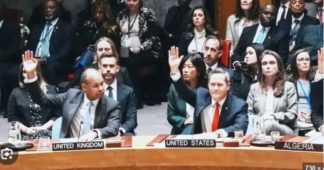By Mera Aladam
Nov 18, 2025
Craig Mokhiber, former senior human rights official, describes Security Council vote on US resolution as a ‘day of shame’
A former senior UN human rights official has denounced the Security Council’s adoption of a resolution backing a US plan for foreign forces and governance in Gaza, calling it a “colonial outrage”.
Craig Mokhiber, former director of the New York office of the UN High Commissioner for Human Rights (OHCHR), described the vote as a “day of shame” for the UN and accused governments worldwide of being “on their knees before the US empire and its violent Israeli client”.
He criticised the “horrific” resolution as a violation of international law.
“This proposal has been rejected by Palestinian civil society and factions, as well as by defenders of human rights and international law everywhere,” Mokhiber said on X.
He concluded: “The struggle for Palestinian freedom will continue undeterred.”
The plan is based on US President Donald Trump’s 20-point plan for Gaza’s future, including only a singular line that envisions a future Palestinian state.
It outlines a Trump-chaired “Board of Peace” to oversee affairs in Gaza as a transitional authority.
It also authorises an “international stabilisation force” that would ensure “demilitarisation” of Gaza.
‘New colonialism’
Hamas and other Palestinian factions, including Islamic Jihad, have condemned the resolution for imposing an “international guardianship” over Palestinians.
“The resolution imposes an international guardianship mechanism on the Gaza Strip, which our people and their factions reject,” Hamas said.
“It also seeks to achieve the occupation’s objectives, which it failed to accomplish through its brutal genocide.”
The Palestinian movement criticised the resolution for “detaching the Gaza Strip from the rest of Palestinian territory” in an attempt to impose new realities against the will of the Palestinian people.
The Islamic Jihad Movement also affirmed its rejection of the US resolution, stating that it violates the Palestinian people’s “right to self-determination”. It further condemned the use of humanitarian aid as a tool of pressure and noted that the resolution fails to hold Israel accountable for the blockade of Gaza.
The Palestinian Authority, however, welcomed the vote and said it was prepared to work with the Trump administration to advance the plan.
Critics argue the US draft seeks to use the UN’s authority to normalise Israel’s genocide and impose another foreign regime on Palestinians. The plan is also criticised for operating outside recognised international legal frameworks, establishing a parallel order based on security control and external authority.
On Sunday, a group of Palestinian organisations issued a statement rejecting US proposals to place Gaza under an externally imposed transitional administration, warning that such a move amounts to “a new colonialism”.
The National Commission for Palestinian Popular Action (NCPPA) said any attempt to install a governing body “outside the will of the Palestinian people” violates their right to self-determination and repackages old forms of domination “under updated labels”.
The NCPPA, a global alliance that includes the Popular Conference for Palestinians Abroad, the Palestinian National Conference, the Popular Palestinian Conference, the Palestinian Federation in Latin America, and independent Palestinian figures, recently held a conference in Istanbul, according to the Palestinian Information Centre.
.
We remind our readers that publication of articles on our site does not mean that we agree with what is written. Our policy is to publish anything which we consider of interest, so as to assist our readers in forming their opinions. Sometimes we even publish articles with which we totally disagree, since we believe it is important for our readers to be informed on as wide a spectrum of views as possible.











